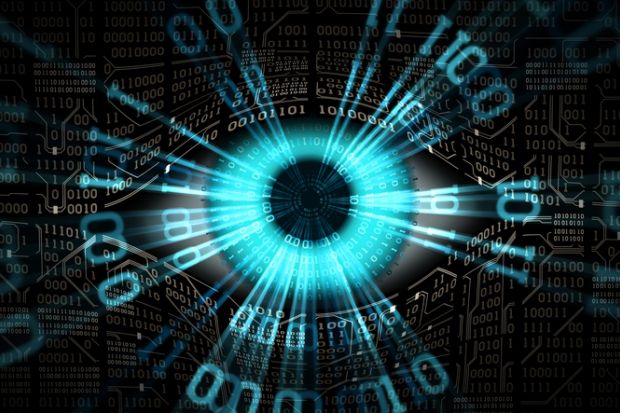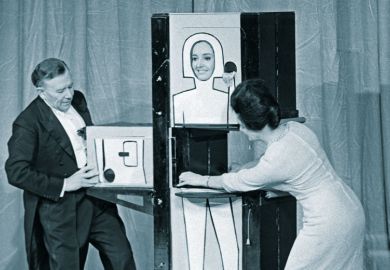In a difficult funding environment, digital transformation is seen by many UK university managers as essential, allowing them to further their reach, improve efficiency and maintain competitiveness.
But another thing that digital transformation enables is staff performance monitoring. This, in itself, is not unreasonable and does not equate to an erosion of academic freedom. But the risk of overreach clearly exists. The question is whether it is already occurring.
To explore that question, we conducted a sector-wide survey in 2021 of more than 2,100 UK academics in collaboration with the University and College Union. And the results are distinctly worrying.
In research, academic freedom is generally considered to consist of the ability to choose what to research, how to do it and how to disseminate findings. But many universities are signed up to Elsevier’s SciVal system, which uses Scopus data to benchmark research performance against competitor universities and analyse institutional research trends. Universities can drill down into the key performance metrics of particular subjects and even individual academics, including identifying their 500 top researchers and ranking them on output quantity, citation count and h-index.
Our survey shows that academics are highly conscious of their research performance being monitored. For grant application success, citation performance and alignment of research to institutional themes, awareness figures were found to be 90, 80 and 73 per cent respectively.
Moreover, the survey suggests that this monitoring affects academics’ sense of academic freedom because they are wary of the potential misuse of monitoring data, such as when the University of Liverpool used citations to inform a redundancy process in 2021.
One survey respondent said the sense of being monitored for their grant success forced them “to look to the broader funding priorities, rather than being curiosity-driven”. Another said that “watching close colleagues being made redundant for researching ‘wrong’ perspectives has inhibited me from following my interests”.
In teaching, academics are accountable to students (for satisfaction and attainment) and to internal colleagues responsible for enforcing an ever-expanding range of institutional quality assurance policies and processes.
Most universities are now able to monitor whether individual academics’ sites within the institutional Virtual Learning Environment (VLE) meet central quality guidance. They can also surveil lecturers’ engagement with the VLE. Our survey shows that 82 per cent of academics have high awareness that their teaching is being monitored via the VLE.
In addition, 78 per cent are aware of lecture recording technology being used for monitoring and 71 per cent are aware of their grading practices being monitored via Turnitin – such as in relation to institutional grade inflation/deflation policies.
In terms of impact, 58 per cent feel that monitoring affects the grades they give and 64 per cent say it shapes the level of academic freedom they feel.
One respondent said: “Assessments have to conform to what the university’s management…expect and not as is standard within my subject area. For example, exams are seen as a no-no by management, yet all the evidence suggests students perform better and are more likely to pass exams. We also have to ‘fudge’ our marking to ensure we meet the institutional demand that the average mark on any given module is at least 60 per cent and that at least 90 per cent of students pass…Essentially, we’re pressured to not mark ourselves out of our jobs.”
As for lecture content, one respondent said, “I am less likely to raise contentious social policy issues and would not engage (in any recorded format) in highly contentious issues”. Another said they “feel pressured to confirm to a singular, vague notion of quality”.
Nor does the sense of constricted academic freedom end at the classroom door. Another academic was aware that their institution had “initiated disciplinary proceedings against staff for comments made on social media, so I am keenly aware of how monitored my activities are”.
Staff are exposed to a constant flow of rhetoric about the essential role of monitoring and performance management in promoting quality, which can become difficult to step outside of. Nevertheless, 71 per cent of respondents strongly agree that pressure to align academic behaviour with institutional preferences is impacting negatively on staff well-being, and 72 per cent strongly agree it is degrading work satisfaction.
In one sense, the tension between institutional performance management practices and academic freedom is integral to the workplace dynamic that perhaps helps position the UK higher education sector as one of the most successful in the world in terms of publication quality and quantity, research impact and quality of teaching.
And while UK universities are considered managerial, what protects them against the decline that can come with being overly so might be, ironically, that they do not undertake digital transformation quickly or competently. Moreover, even when they do, data-driven management can be undermined – though not necessarily for the better – by managers’ human frailties. One respondent said that at their monitoring institution promotions still depended on “whether the dean likes you. Hence, recently promotions are poorly qualified but favoured/advantaged individuals.”
Moreover, significant numbers of staff still resist monitoring practices through tactics such as cynical adoption of its language but not its spirit. Whether this resistance will endure, however, is unclear given current levels of redundancies.
The risk is that academics feel they have no choice but to accept the loss of their cherished academic freedom and professional satisfaction when the alternative is to lose their jobs. Unions are necessary now more than ever to ensure that this risk does not come to pass.
Chavan Kissoon is a lecturer in digital education and Terence Karran is emeritus professor of higher education policy at the University of Lincoln.




